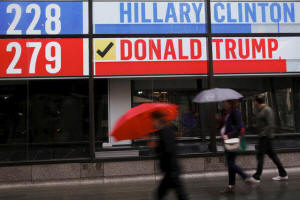|
China state media warns Trump against
isolationism, calls for status quo
 Send a link to a friend
Send a link to a friend
 [November 10, 2016]
BEIJING (Reuters) - Chinese state
media has warned the U.S. president-elect against isolationism and
interventionism, calling instead for the United States to actively work
with China to maintain the international status quo. [November 10, 2016]
BEIJING (Reuters) - Chinese state
media has warned the U.S. president-elect against isolationism and
interventionism, calling instead for the United States to actively work
with China to maintain the international status quo.
President-elect Donald Trump threatened to tear up trade deals and
pursue a more unilateral foreign policy under his "America First"
principle during a tempestuous election campaign.
But China and other foreign governments are uncertain how much of
Trump's rhetoric will be translated into policy because he has at times
made contradictory statements and provided few details of how he would
deal with the world.
Trump often targeted China in the campaign, blaming Beijing for U.S. job
losses and vowing to impose 45 percent tariffs on Chinese imports. The
Republican also promised to call China a currency manipulator on his
first day in office.
U.S. isolationist policies had "accelerated the country's economic
crisis" during the Great Depression, warned a commentary by China's
official Xinhua News Agency, though it added that "election talk is just
election talk".
The commentary also cautioned against any tilt towards intervention.

POTENTIAL PRAGMATIST
The Chinese media in the past have criticized the United States and
other Western powers for intervening in Afghanistan and Iraq and
meddling in international hot spots such as Ukraine.
"History has proven that U.S. overseas military interventionism causes
them to pay disastrous political and economic costs," the commentary
said.
Hillary Clinton was widely seen in China as the more hawkish of the two
candidates, while some Chinese commentators saw Trump as a potential
pragmatist on foreign policy.
But Beijing fears the unpredictability of a Trump presidency as it seeks
to maintain an equilibrium in Sino-U.S. relations while dealing with the
daunting tasks of a reform agenda to combat a slowing economy at home.
A second Xinhua commentary published on Thursday morning said the new
U.S. president and China should "jointly build a new model of major
power relations". That echoes the position of Chinese President Xi
Jinping that says global powers should work to accommodate, not contain,
a rising China in the international system.
[to top of second column] |

People walk by an electronic billboard in New York U.S., November 9,
2016. REUTERS/Shannon Stapleton

'SHOCK OF HERESY'
Trump's victory was watched closely on the Chinese internet with the
tag "Trump has won" becoming the most-searched term on Weibo, a
popular Chinese microblog service, on Wednesday afternoon in Asia,
well before the race was conceded.
Some of the posts agreed that Trump might be just the change agent
the United States needs now.
"The U.S. has chosen indeterminacy in order to create change,"
according to a post by Tsinghua University professor Sun Liping on
Thursday that has been shared over a thousand times.
"When the usual, determined method has already been unable to solve
the problems, then you need the shock of heresy instead."
Chinese state media had previously said the U.S. election process
reflects a troubled political system, and showed an increasingly
divided, disillusioned and indignant U.S. citizenry.
"This election has also made clear that the U.S. political system is
already caught in a predicament," a third Xinhua commentary said.
"As for when it will exit this predicament, the answer is still
unknown."
The Global Times, a tabloid published by the ruling party's People's
Daily newspaper, said Trump's victory had "dealt a heavy blow to the
heart of U.S. politics" but that he would be unable to make many
changes in U.S. foreign policy.

"In an elite-controlled U.S., most of those holding power don't
support Trump. And U.S. allies across the world will pressure
Washington to restrain Trump from isolationism," it said.
(Reporting by Beijing Newsroom; Editing by Ryan Woo and Bill
Tarrant.)
[© 2016 Thomson Reuters. All rights
reserved.]
Copyright 2016 Reuters. All rights reserved. This material may not be published,
broadcast, rewritten or redistributed. |